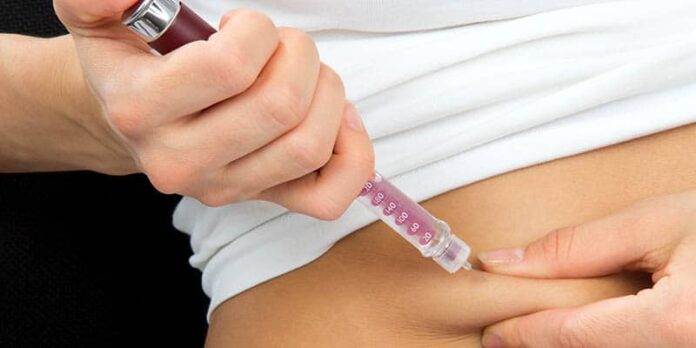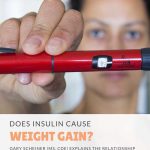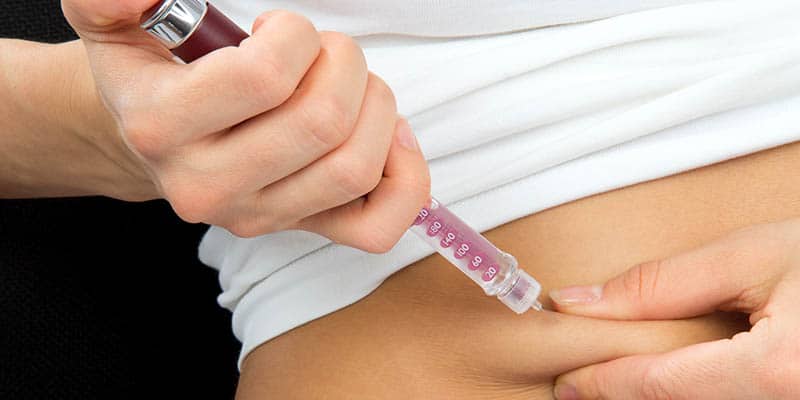Insulin is the most potent and effective treatment for elevated blood glucose levels.
Everyone with Type-1 diabetes needs insulin to stay alive, and millions of people diagnosed with Type-2 diabetes in the United States require insulin to control their blood glucose levels (1).
However, even insulin is not without its side effects. One of the most common concerns expressed by people who use insulin is that it tends to cause weight gain. In fact, research from the United Kingdom Prospective Diabetes Study (UKPDS) showed that the average person with Type-2 diabetes gained about nine pounds in their first three years of insulin use (2).
Since achieving and maintaining a healthy weight are important for everyone with diabetes, let’s discuss why this happens and what can be done about it.
“Why does insulin cause weight gain?”
Insulin is a hormone that promotes the uptake of sugar (glucose) by almost all of the body’s cells, including muscle, liver and fat cells. At any given time, our cells are also burning glucose for fuel. If our fuel intake (calories eaten) is greater than our energy expenditure (calories burned), we tend to store more glucose than we burn. Muscle and liver cells store this extra glucose in a form called “glycogen”, which is a very dense, compact form of glucose. Fat cells store the extra glucose as fat.
High blood sugars and a lack of insulin cause our weight to be artificially low. When diabetes is not well controlled, blood glucose levels are too high. This means that there is not enough insulin to store all of the food we consume.
When our muscle, liver and fat cells are unable to take in all of the glucose from the food we eat, and unnatural form of weight loss takes place. When blood glucose levels are particularly high, some of the excess glucose passes into the urine, which causes excess urination. In other words, we literally “pee away” some of the food we have consumed. This can cause artificial weight loss in the form of both water and energy. We may still be consuming more calories than we burn, but since many of the calories are urinated away, we weight less than we really should.
Once insulin therapy begins and blood glucose levels come down towards normal, the excess urination and loss of glucose through the urine comes to a stop. Our cells resume storing all of our food in the form of fat or glycogen, and our weight returns to a level that is appropriate for our food intake and calorie expenditure. In other words, insulin simply restores healthy blood glucose levels and allows us to weigh what we should based on our diet and exercise patterns.
“What’s the point of using insulin if it just makes me gain weight? Doesn’t weight gain make blood sugar harder to control?”
Yes, insulin may restore you to a more “natural” weight based on your lifestyle habits. And weight gain does tend to cause insulin resistance, which makes blood sugars harder to control. But you may have to look at the initial weight gain as a temporary investment in a lifetime of better health.
Remember, insulin is a very strong hormone; it can overcome insulin resistance and get blood sugar levels down to normal. And normal blood sugars are essential for making the kind of lifestyle changes that will ultimately help you to lose body fat and maintain a healthy weight.
Elevated blood glucose levels tend to make people tired and lethargic. It is not easy to exercise when you feel that way! Lowering blood glucose levels can restore your energy and give you the strength and attitude to maintain an active lifestyle.
High blood glucose can also make you feel hungry. Keeping your blood glucose near normal will allow you to better manage your food intake, particularly consumption of high-calorie sweets and other snacks.
In other words, gain a little today to lose a lot tomorrow.
“How can I keep myself from gaining too much weight when I use insulin?”
Accept the fact that with insulin use and lower blood sugars, there is a tendency to put on some initial weight. So how can you keep gaining too much? Here are a few ideas:
Avoid hypoglycemia
If you are experiencing any low blood sugars (typically defined as a blood glucose of less than 70mg/dl), talk to your healthcare team about cutting back on the insulin that is working when the lows are taking place. Likewise, if you need to eat to prevent low blood sugar, you may be taking too much insulin. Not only does low blood sugar require you to eat food that you typically would not consume, it also indicates that you are overinsulinized – taking more insulin than your body needs. Excess insulin will promote the buildup of fat stores and excessive weight gain.
Reduce doses whenever possible
Along the same lines, look for every opportunity to reduce your insulin requirements. Cutting back on carbohydrate intake is one way to accomplish this.
Eliminating carbohydrate-containing drinks is a good place to start. So is cutting out between-meal snacks. At mealtimes, reduce your portions of carbohydrate-rich foods such as potatoes, rice, bread, pasta, and cereal. Instead, increase your portions of lean meats and non-starchy vegetables.
Physical activity can also help lower your insulin requirements by enhancing how well your insulin works. Extra walking throughout the day may allow you to lower your dose of long-acting (or “basal”) insulin.
Moderate exercise after meals may allow you to significantly reduce your rapid-acting mealtime (“bolus”) insulin. Talk to your healthcare team about making these kinds of adjustments.
Also, look for ways to cut back on your stress levels. Emotional stress makes your body resistant to insulin. Learning to relax can go a long way towards reducing your insulin needs. It can also put you in the right frame of mind to eat and exercise the way you should.
Lifestyle, Lifestyle, Lifestyle
Ahhh… the three most important words in diabetes management. Stress reduction, physical activity, and healthy eating all help you to lose weight. And weight loss, in turn, helps your insulin to work better! When insulin works better, your insulin needs go down, which helps you to lose even more weight. What a beautiful cycle!
One of the best ways to start on the road to a healthier lifestyle is to meet with a registered dietitian with expertise in both diabetes and weight control. Meal planning guidance and education has been shown to reduce insulin-related weight gain (5).
Medicate Wisely
When using a long-acting insulin, 24-hour “basal” insulin such as glargine or levemir tends to produce less weight gain than intermediate-acting insulin such as NPH
(3,4). There also tends to be less hypoglycemia with the 24-hour basal insulin, which as stated above, is beneficial in terms of weight control. Use of an insulin pump can also eliminate unnecessary insulin doses, and usually results in a 10-20% reduction in total insulin usage while improving blood glucose control (6,7).
Many people take another diabetes medication along with their insulin to help reduce the required doses. Insulin sensitizing agents such as rosiglitazone or pioglitazone can help reduce insulin requirements. Metformin reduces the body’s natural secretion of glucose into the bloodstream, which can also reduce insulin needs. Pramlintide, an injectable medicine, helps to slow digestion, blunt appetite and block glucagon secretion, often resulting in reduced mealtime insulin requirements.
And exenatide, another injectable medicine, helps to improve insulin sensitivity and enhance the body’s own insulin production after meals.
Suggested next post: Are Exercise-Induced Lows Making You Gain Weight?
References:
- NIDDK 2001-2003 National Health Interview Survey among adults with diabetes.
- United Kingdom Prospective Diabetes Study Group: Intensive blood glucose control with sulfonylureas or insulin compared with conventional treatment and risk of complications in patients with type 2 diabetes. Lancet 353:837¬853,1998
- Rosenstock J, Schwartz S, Clark C, Park GD, Donley DW, Edwards MB: Basal insulin therapy in type 2 diabetes: 28-week comparison of insulin glargine (HOE 901) and NPH insulin. Diabetes Care 24:631-636, 2001
- The Impact of Insulin Glargine on Clinical and Humanistic Outcomes in Patients Uncontrolled on Other Insulin and Oral Agents. Jerome S. Fischer; Trent McLaughlin; Litza Loza; Rebecca Beauchamp; Sherwyn Schwartz; Mark Kipnes. Curr Med Res Opin 20(11):1703-1710, 2004
- Monk A, Barry B, McClain K, Weaver T, Cooper N, Franz M: Practice guidelines for medical nutrition therapy provided by dietitians for persons with non-insulin-dependent diabetes mellitus. J Am Diet Assoc 95:990-1006, 1995
- J. Hans DeVries, MD, Frank J. Snoek, PH2, Piet J. Kostense, PHD, Nathalie Masurel, RN and Robert J. Heine, MD, PHD
- On behalf of the Dutch Insulin Pump Study Group, A Randomized Trial of Continuous Subcutaneous Insulin Infusion and Intensive Injection Therapy in Type 1 Diabetes for Patients With Long-Standing Poor Glycemic Control. Diabetes Care 25:2074-2080, 2002
- Insulin Pump Therapy: A meta-analysis, Jill Weissberg-Benchell, PHD, CDE1, Jeanne Antisdel-Lomaglio, PHD2 and Roopa Seshadri, PHD, Diabetes Care 26: 1079-1087, 2003



